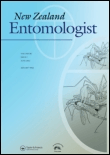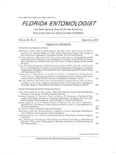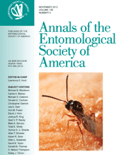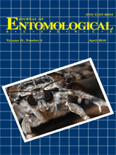
NEW ZEALAND ENTOMOLOGIST
Scope & Guideline
Unveiling the Secrets of Insect Biology and Ecology
Introduction
Aims and Scopes
- Insect Taxonomy and Systematics:
The journal places a strong emphasis on the classification and identification of insect species, including the description of new species and revisions of existing taxonomic groups, reflecting the rich biodiversity of New Zealand. - Ecology and Behavior of Insects:
Research on the ecological roles and behaviors of insects within various habitats is a core focus, examining interactions with other species, including plants and other insects, as well as their responses to environmental changes. - Conservation and Biocontrol:
The journal addresses issues related to the conservation of native insect species, the impact of invasive species, and the potential for biological control, providing insights into sustainable pest management practices. - Community Science and Biodiversity Monitoring:
There is a growing interest in community involvement in biodiversity monitoring, with studies leveraging citizen science to gather data on insect populations and distributions, enhancing public engagement with entomology. - Pathogen Interactions and Microbial Ecology:
Research exploring the interactions between insects and pathogens, including studies on gut microbial communities, is increasingly prominent, highlighting the importance of these relationships in insect health and ecology.
Trending and Emerging
- Community Science Initiatives:
There is an increasing trend towards utilizing community science for data collection in entomological research, reflecting a recognition of the value of public participation in biodiversity monitoring and conservation efforts. - Molecular Techniques in Taxonomy:
The application of molecular techniques, such as DNA barcoding, is on the rise, facilitating more accurate species identification and understanding of genetic diversity among insect populations. - Impact of Climate Change on Insect Populations:
Research focusing on the effects of climate change on insect behavior, distribution, and ecology is becoming more prominent, as scientists seek to understand how shifting climates will impact local biodiversity. - Insect-Microbe Interactions:
Studies exploring the relationships between insects and their associated microbial communities are emerging as a significant area of interest, highlighting the role of microbes in insect health and ecology. - New Species Descriptions and Biodiversity Conservation:
The identification and description of new species are increasingly important, emphasizing the need for conservation efforts to protect New Zealand's unique entomological heritage.
Declining or Waning
- General Insect Surveys:
While specific studies on certain insect groups continue, broad surveys of insect populations without specific ecological or taxonomic focus have decreased, suggesting a shift towards more targeted research questions. - Traditional Pest Management Practices:
There appears to be a waning interest in conventional pest management studies, as the journal increasingly highlights innovative biocontrol methods and ecological approaches to pest management. - Historical Taxonomic Reviews:
Research dedicated to historical taxonomic reviews of well-established groups has diminished, possibly in favor of studying newly discovered species or more dynamic ecological interactions. - Invasive Species Lists:
The publication of general lists of invasive species has decreased, reflecting a more nuanced approach to studying the impacts of specific invasive species on ecosystems rather than broad enumerations.
Similar Journals

FLORIDA ENTOMOLOGIST
Advancing the Frontiers of Insect ScienceFLORIDA ENTOMOLOGIST is a prestigious peer-reviewed journal dedicated to the advancement of entomological sciences, published by Walter de Gruyter GmbH. Since its transition to open access in 1994, the journal has become a vital resource for researchers, students, and professionals in the fields of Insect Science and Ecology, Evolution, Behavior, and Systematics. With an impact factor ranking high in its category—Q2 in Insect Science and Q3 in Ecology, Evolution, Behavior and Systematics—the journal showcases significant findings and contributions that shape our understanding of insect biology and its implications for ecological systems. The journal is indexed in Scopus, further establishing its relevance, with current rankings reflecting its competitive standing within Agricultural and Biological Sciences. Published continuously since 1982, FLORIDA ENTOMOLOGIST not only facilitates the dissemination of knowledge among entomologists but also encourages interdisciplinary collaboration, making it an essential publication for anyone invested in the scientific study of insects.

Current Research in Insect Science
Pioneering Research in Insect Ecology and EvolutionCurrent Research in Insect Science is a premier journal published by Elsevier, dedicated to advancing knowledge in the field of insect science and its multifaceted applications across ecology, evolution, and behavior. Established in 2021, this journal aims to provide a platform for researchers to disseminate innovative findings that address the ecological significance of insects, their evolutionary processes, and their behavior in diverse environments. With an impressive Q2 ranking in Animal Science and Zoology, Ecology, Evolution, Behavior and Systematics, and Insect Science categories, the journal enjoys a reputable status within the academic community. Its Scopus ranks reflect its impactful contributions to the field, placing it within the top 30% of publications in relevant disciplines. While the journal operates on an open access model, ensuring wide accessibility to research, it remains committed to maintaining rigorous peer-review standards. Researchers, professionals, and students alike will find Current Research in Insect Science an invaluable resource for staying informed on the latest advancements and discussions in insect biology.

JOURNAL OF INSECT SCIENCE
Advancing Knowledge in Entomology and BeyondJOURNAL OF INSECT SCIENCE, published by OXFORD UNIV PRESS INC, stands as a pivotal platform in the field of insect science, offering open-access research since 2001. With an impactful presence in the academic community, this journal spans the convergence of entomology and various interdisciplinary studies, establishing itself in the Q2 quartile for both Insect Science and Medicine (miscellaneous) categories as of 2023. This esteemed journal is recognized for its contributions to the understanding and management of insect biology, ecology, and their implications for agriculture and human health, garnering a Scopus rank of 44 out of 181 in Agricultural and Biological Sciences. The Open Access model encourages wide dissemination of knowledge, making the rich repository of research accessible to a global audience. With ongoing publications until 2024, JOURNAL OF INSECT SCIENCE serves as an essential resource for researchers, professionals, and students seeking to deepen their understanding of the crucial role insects play in our ecosystem.

ANNALS OF THE ENTOMOLOGICAL SOCIETY OF AMERICA
Elevating Knowledge in Agricultural and Biological SciencesANNALS OF THE ENTOMOLOGICAL SOCIETY OF AMERICA is a premier journal dedicated to advancing the field of insect science, published by Oxford University Press. With an impressive impact factor and classified in the Q1 quartile for its category, this journal ranks among the top publications in agricultural and biological sciences, specifically within insect science, positioned at #28 out of 181, indicating its significant influence and high-quality research contributions. The journal aims to disseminate original research, comprehensive reviews, and groundbreaking findings that enhance our understanding of entomology, spanning across ecological, evolutionary, and applied segments. With a consistent publication history since 1938, researchers, professionals, and students will benefit from the wealth of knowledge presented in its pages. Although the journal does not currently offer open access, it remains a vital resource for those seeking to stay at the forefront of entomological research and innovation.

Insects
Bridging Gaps in Insect Research and ApplicationInsects is a prominent open-access journal published by MDPI, dedicated to advancing research in the vibrant field of insect science. Since its inception in 2011, this journal has become a vital resource for academics and professionals alike, also ranked in the prestigious Q1 category within the Insect Science field by Scopus, achieving a remarkable rank of 26 out of 181 journals. With an ongoing convergence period from 2010 to 2024, Insects provides comprehensive coverage of various aspects of entomology, including but not limited to ecology, behavior, physiology, and applied entomology. Based in Switzerland, the journal promotes an open-access model, ensuring that vital research is readily available to researchers, practitioners, and students globally. This journal not only facilitates the dissemination of groundbreaking entomological research but also fosters collaboration and interdisciplinary dialogue in the field.

FRAGMENTA ENTOMOLOGICA
Fostering global discourse on insect behavior.FRAGMENTA ENTOMOLOGICA is a prominent peer-reviewed academic journal published by UNIV DEGLI STUDI DI ROMA LA SAPIENZA, focusing on various dimensions of entomology and insect science. With an ISSN of 0429-288X and an E-ISSN of 2284-4880, this journal has embraced an Open Access model since 2006, ensuring that valuable research is widely accessible to the global scientific community. Based in Italy, at the DIPARTIMENTO DI BIOLOGIA ANIMALE E DELL'UOMO in Rome, FRAGMENTA ENTOMOLOGICA is recognized for its commitment to high-quality research, ranking in the Q3 category across multiple categories, including Ecology and Insect Science, in 2023. Its Scopus rankings further underscore its relevance, showcasing its role in advancing knowledge in the fields of Ecology, Evolution, and Insect Behavior. This journal serves as an essential resource for researchers, professionals, and students interested in the intricate world of insects and their ecological roles, fostering academic discourse that bridges theoretical and practical entomological studies.

CANADIAN ENTOMOLOGIST
Connecting Scholars through Insect Science InsightsCanadian Entomologist, published by Cambridge University Press, is a prominent journal dedicated to the field of entomology, covering key areas such as insect science, ecology, and evolutionary biology. With its origins dating back to 1868, this esteemed journal has continuously contributed to the understanding of insect behavior, systematics, and physiology, engaging researchers and professionals alike. Although currently not an Open Access journal, it offers valuable insights through its rigorously peer-reviewed articles, reflecting its commitment to scientific excellence. The journal has garnered a respectable Q3 ranking in various categories, including Ecology, Evolution, Behavior, and Systematics, making it a critical resource for scholars and students who seek to explore the complex interactions within insect populations and their environments. Researchers can trust Canadian Entomologist to provide relevant and impactful research that shapes contemporary understanding in the realm of entomological studies, fostering the growth of this vital scientific discipline.

Journal of Insect Biodiversity
Unveiling the Secrets of BiodiversityJournal of Insect Biodiversity, published by MAGNOLIA PRESS in New Zealand, offers a vital platform for researchers and professionals interested in the intricate world of insect science. Established in 2019, this journal covers a wide array of topics within its field, focusing on the ecological, evolutionary, and behavioral aspects of insects, while also engaging with paleontological perspectives. With an impressive Q2 and Q3 categorization in multiple ecological disciplines and a growing influence in the Scopus rankings, it serves as an essential resource for scholars aiming to deepen their understanding of insect diversity and its implications for ecosystems. The journal is committed to open access, promoting the dissemination of knowledge without barriers. Researchers, students, and professionals alike will benefit from the timely contributions this journal offers as it continues to reflect the dynamic and evolving nature of insect research up to the year 2024.

Frontiers in Insect Science
Advancing the Insect Science FrontierFrontiers in Insect Science is a pioneering open-access journal dedicated to the advancement of knowledge in the field of insect science. Published by FRONTIERS MEDIA SA in Switzerland, this journal serves as a vital platform for researchers, professionals, and students to disseminate high-quality, peer-reviewed research spanning diverse topics within insect biology, ecology, and pest management. Since its establishment in 2021, the journal has gained recognition, ranking in the Q2 category of Insect Science with a Scopus ranking of #92 out of 181 in the field. With a commitment to promoting open access and collaboration, Frontiers in Insect Science is instrumental in fostering innovative research and practical applications essential for combating biodiversity loss and enhancing agricultural sustainability. As a freely accessible resource, it invites contributions that impact both fundamental and applied insect research, connecting a global network of scholars eager to explore the fascinating world of insects.

JOURNAL OF ENTOMOLOGICAL SCIENCE
Pioneering Insights in Insect Science and EcologyJOURNAL OF ENTOMOLOGICAL SCIENCE, published by the Georgia Entomological Society Inc, is a crucial resource in the field of insect science and ecology. With a rich history since its inception in 1993, the journal provides a platform for innovative research and comprehensive reviews addressing various aspects of entomology. Although not an open-access journal, it is highly regarded within its community, holding a Q3 ranking in Agronomy and Crop Science, Ecology, Evolution, Behavior and Systematics, and Insect Science as of 2023. Each issue promises to contribute valuable insights to professionals, researchers, and students alike, making it an essential publication for those looking to stay abreast of developments in entomological studies. The journal's editorial commitment ensures that it remains at the forefront of entomological research through rigorous peer reviews and a dedication to scholarly excellence.